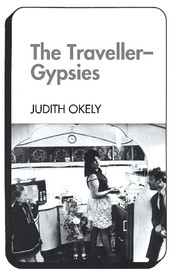Book contents
- Frontmatter
- Contents
- Dedication
- Preface
- 1 Historical categories and representations
- 2 Modern misrepresentations
- 3 Methods of approach
- 4 Economic niche
- 5 Self-ascription
- 6 Symbolic boundaries
- 7 Gorgio planning
- 8 Travelling
- 9 The trailer unit, spouses and children
- 10 Group relations and personal relatives
- 11 Gypsy women
- 12 Ghosts and Gorgios
- Concluding remarks
- Extract from The Scholar Gypsy
- Notes
- References
- Index
9 - The trailer unit, spouses and children
Published online by Cambridge University Press: 04 December 2009
- Frontmatter
- Contents
- Dedication
- Preface
- 1 Historical categories and representations
- 2 Modern misrepresentations
- 3 Methods of approach
- 4 Economic niche
- 5 Self-ascription
- 6 Symbolic boundaries
- 7 Gorgio planning
- 8 Travelling
- 9 The trailer unit, spouses and children
- 10 Group relations and personal relatives
- 11 Gypsy women
- 12 Ghosts and Gorgios
- Concluding remarks
- Extract from The Scholar Gypsy
- Notes
- References
- Index
Summary
Composition
The term ‘household’ is a misnomer for Travellers in caravans, given also their distaste for housedwelling. The domestic unit is best referred to by the Gypsies' word ‘trailer’ and in contrast to the Gorgio ‘caravan’. (When talking to Gorgios, the Gypsies switch to the word ‘caravan’ thereby appearing to conform to the dominant ideology yet preserving their own.)
The trailer is the moving home and shared sleeping, cooking and eating quarters for a family, whose members may collaborate in earning a living, budgeting, and the upbringing of children. It can also be an independent travelling unit. The great majority of these units consisted of a two generation nuclear family living in one or more trailer, tent or hut. Although families camped alongside each other and formed work partnerships, they continued to budget separately and owned no property in common. The trailer unit, usually the nuclear family, is an important unit for production and consumption, but depends on cooperation with other Travellers. It is of course never self-sufficient, given the Gypsies' position within the wider economy.
Unless the nuclear family becomes ‘fragmented’ by the death or desertion of a spouse, it does not merge with another. (The term ‘fragmented family’ denotes a domestic unit which does not contain both a husband and wife.) Usually lone adults attach themselves to another nuclear family. A single adult, with or without children, is scarcely viable in an independent trailer unit.
- Type
- Chapter
- Information
- The Traveller-Gypsies , pp. 152 - 169Publisher: Cambridge University PressPrint publication year: 1983



